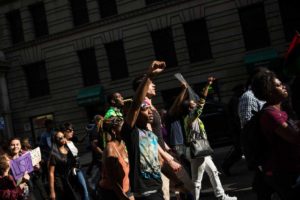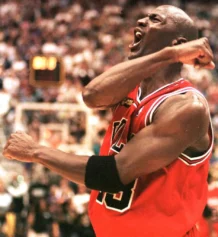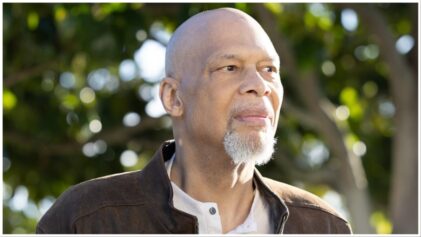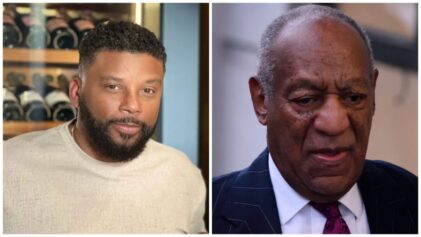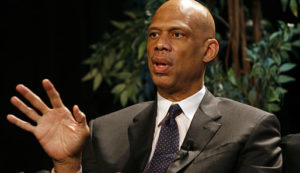
A voice for the disenfranchised much of his life, he has spoken or written about social injustices with eloquence and perspective. For Time magazine, Abdul-Jabbar, still recovering from heart surgery, weighed in with strong, insightful positions that show how in tune he is — and how other athletes can follow his lead.
The former center started his essay by writing: “The curfew has been lifted in Baltimore, and now all of God’s children are once again tucked back in the snug routine of their daily lives. The black temper tantrum is over, America. We can all go back to watching Castle boyishly charm his way through murder mysteries. Order is restored.
“Except, as Sportin’ Life says in Porgy and Bess, ‘It ain’t necessarily so.’”
Abdul-Jabbar used sports lingo to make the point that more uprisings could be on the horizon and that the impact of the uprising will not end any time soon. “What happened in Baltimore isn’t just a one-and-done situation,” he wrote. “This wasn’t just a slight sprain in the ankle that we’ll be able to walk off by morning. This was a violently shattered bone that will have America limping forward on crutches for months to come, maybe even years.
“One thing that history has taught us is that civil unrest is rarely just about what incites the incident. From what information the public has been given, Freddie Gray’s death seems like a malignant cocktail of negligence and abuse, and the charges brought against the six officers seem to confirm that. But we’ve seen this all before — many times.”
Significantly, like many, including the protesters indicated, the response to the death of Gray is bigger than that one horrible action, Abdul-Jabbar conveyed. And he rightfully expresses worry over the idea that the outrage will flicker and not rage.
“The Baltimore uprising isn’t just about Freddie Gray. The image of the cops carrying him, his legs dangling uselessly, his neck crooked awkwardly is a visual manifestation of the impotence many African Americans have felt over the past year as death after death of black people at the hands of police keep adding up,” Abdul-Jabbar wrote. “After each death there is the usual flurry of outrage, protests, political promises, celebrity tweeting, and condemnation of protestors. Then nothing happens until the next death, which is often tragically close behind. About 70 unarmed Blacks have been killed by police between 1999 and 2014. The only thing that seems to change is that the list of the dead keeps getting longer.”
Abdul-Jabbar was not well-liked by the media during his playing days because he saw through them. He saw most of them as vultures seeking inflammatory information or personal info that was no one’s business. So, he often was described as “surly” or “petulant.” The reality was that he was insightful and a deep thinker who was intellectually superior to the reporters who covered him.
That mind — and his courage to speak out on racial injustice — came through when he wrote: “Baltimore is the most recent in a long, frustrating line of protests that … reveal a larger pattern of systemic injustice. For African Americans, it feels as if we are all gathered together in the path of giant steamroller. We shout up at the driver to put on the brakes, but he keeps shouting for us to get out of the way. But there’s no place to go. We keep backing up and backing up. In Baltimore, it felt as though everyone’s back was against the wall, and there was no place to back up to anymore. If shouting doesn’t get the driver’s attention, maybe something more drastic will.
“Baltimore protestors weren’t just expressing their anger over the treatment of Freddie Gray; they were expressing their frustration over living in economic circumstances that makes them seem less than human to those in power. Worse, they have little hope that these circumstances will change.”
Not many people — forget about an athlete — express such keen insight, especially considering his fame and wealth have him as far physically removed as one could be from Baltimore. But Abdul-Jabbar clearly is connected. “What’s even more frustrating for African Americans across America witnessing the events is the blatant attempt of some in the media to portray this as (1) the result of “thugs” who want to exploit Gray’s death to stock up on some free TVs and (2) an anomaly that doesn’t represent America,” he wrote. “Both attitudes exhibit the kind of racial profiling that is at the heart of the problem in the first place.”
He ended his nearly 1,100-word essay with a history lesson. “America was born out of protest. We felt economically suppressed and politically repressed, and we changed things. Slaves weren’t freed by benevolent leaders wanting to do the right thing. No one gave the American worker better and safer conditions out of gratitude for a job well done. Vietnam veterans didn’t get their benefits from an Agent-Orange-denying government by sitting at home waiting patiently. Each time, Americans took to the streets to be heard.
“I suggest we all pay attention to what’s happening in Baltimore, because it’s very likely that unless the economic and injustice issues raised there are addressed in a meaningful way across the country, we will be seeing many more Baltimores throughout the election season.”
With that, Abdul-Jabbar threw down the figurative mic. The man who perfected the “sky hook” had scored a slam dunk.
